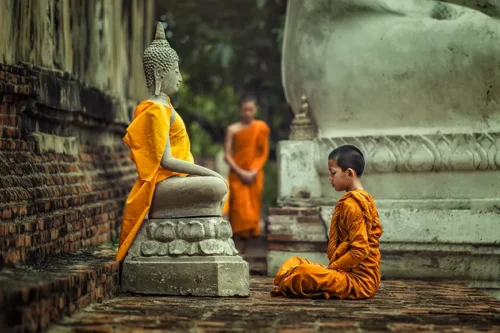
Isha Posham
Once upon a time there was a Buddhist — and because he was a Buddhist, he was considered the wisest. Every king with an issue approached such a person to resolve problems. They who do not involve themselves in war or conflict were believed to have reached full enlightenment. Those who harm nothing were called the greatest human beings.Those who meditate were the only ones who could be calm and serene.
Once upon a time there was a kingdom called India, with the fiercest rulers and the best defences. But have you ever wondered why, after centuries of strength, we were conquered and passed around like a toy through invaders — the Mughals, the British, and so on? I will not blame anyone but us — our own ancestors who instigated the idea that leaving war and becoming a monk or Buddhist makes us great and marks our name in history.
But this goes against everything Hindus stood for. We had something called Dharma. Dharma, in simple words, is the path you are supposed to live by. Back in the day, a king’s dharma was to rule and protect the kingdom, while monks kept peace and performed penance to the gods for the well-being of the people.
A Buddhist becoming a monk was fine — they would pray for the kingdom. But a king becoming Buddhist meant the sword was put down, and often, so was the will to defend.
What Kalinga war did to King Ashoka?
If you don’t agree, let me give you an example — King Ashoka. Once the most formidable ruler of the Mauryan Empire, Ashoka was a warrior before he was a monk. He fought and crushed revolts in Ujjain and Takshashila, secured India’s borders against Greek influence in the northwest, expanded into Karnataka and Bengal to create buffer zones, and waged campaigns to keep trade routes safe. His armies guarded mountain passes so foreign powers could not pour into the subcontinent.
Then came the Kalinga War, fought between the Mauryan Empire and the independent state of Kalinga (present-day Odisha). Kalinga was powerful, rich, and controlled vital coastal trade routes. Ashoka’s victory was brutal — over 100,000 were killed and many more displaced. But instead of continuing to strengthen India’s defences, this war broke him. He embraced Buddhism, renounced military conquest, and shifted from building armies to building peace. While noble in spirit, it also meant that the vast Mauryan Empire — once held together by military strength — began to weaken.
With time, its unity shattered. Regional rulers rose, rivalries grew, and India’s political fragmentation made it easy for outsiders to invade — first by Central Asian kingdoms, later by the Delhi Sultanate, Mughals, and eventually the British.
So, I think yes — Buddhism did weaken India, not because peace is bad, but because when a nation forgets the balance between compassion and defence, it leaves the door open for those who will not hesitate to walk in with a sword.
(Isha Posham, 13 year old girl, studying 9th standard in Aga Khan International School, Hyderabad)


